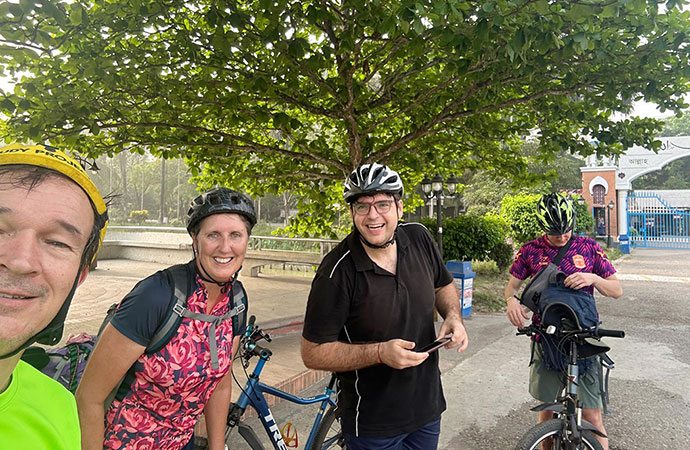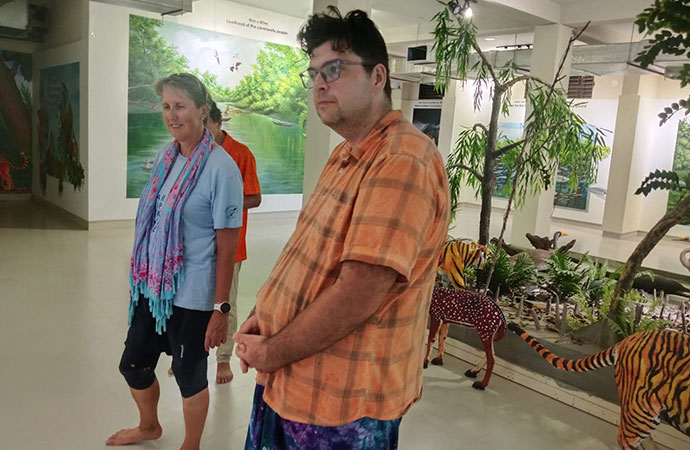Essays

The four bikers: Dutch Ambassador Andre Carstens on extreme left.
The road to saving the Sundarbans has always demanded more than just talk-it requires sweat, blisters, and the kind of stubborn hope that keeps you pedaling when the sun burns, and the path turns rough. On April 28-30, 2025, Dutch Ambassador Andre Carstens proved just that, trading diplomatic corridors for the dust and grit of a 163-kilometer cycling expedition from Barishal to the heart of tiger country: WildTeam's Conservation Biology Centre, TigerHouse, in Joymoni in the Sundarbans.
Accompanied by his son, Carstens Jacobus Hermanus, and two other Dutch friends, Niels van den Berge (former Member of Parliament in the Netherlands) and Jongman Karin, Andre wasn't leading a polished delegation or a media caravan. This was a quiet, deliberate pilgrimage-one that mirrored a similar journey twelve years ago, when a ragtag team of conservationists, diplomats, and students pedaled rickshaws across Bangladesh to sound the alarm for the Bengal tiger. Back then, the mission was to drag the tiger's plight into the spotlight. This time, it was about feeling the pulse of the Sundarbans firsthand-the heat, the whispers of the mangroves, and the weight of its fragile survival.
Andre Carstens, along with the EU Deputy Head of Delegation, Dr. Bernd Spanier, visited the WildTeam Conservation Biology Centre on January 10-11, 2025, for the first time. In less than 80 days, he returned to the same environment just to experience the challenges faced by Bengal tigers, their habitat, and the local communities while also raising awareness among national and international audiences. Andre feels that "People think the Sundarbans is just a forest, but it's a living, breathing shield for Bangladesh. When you bike through it, you see how much it gives-and how much it's losing."
Karin Jongman, Hotel Manager at Le Meridien Dhaka, opines for those who wonder what cycling in Bangladesh is like: "Cycling through the vibrant countryside of Bangladesh is a truly unforgettable experience. Surrounded by lush green fields and towering palm trees, with the sounds of birds and distant chatter filling the air, there are so many picture-perfect landscapes to be observed. Children waving as they ran alongside us, and farmers pausing to smile, their simple yet welcoming nature adding to the charm. Bangladesh has so much to offer, education is needed though to make people understand why the environment is so important and why more efforts need to be made to conserve the greenery and biodiversity in Bangladesh. We experienced incredible hospitality and that makes cycling a wonderful and interesting experience to get to know Bangladesh from a different angle."
Niels van den Berge is a former Member of Parliament in the Netherlands and graduated as an ecologist from the Dutch Wageningen University. He notes that the Bangladesh Sundarbans host a significant proportion of all remaining tigers in the world. "I am impressed by how this densely populated country is managing to do so. Hurray for the communities and organisations like WildTeam who make it happen. In the land of the Hungry Tide, to quote my favourite author Amitav Ghosh. This was my third time in the Sundarbans, but the first time by bicycle. It was an amazing journey. We got support everywhere we went. Village boys helped us carry our bicycles on narrow makeshift bridges. Free tea in a restaurant and many nice conversations."
At TigerHouse, the cyclists were greeted like old friends by TigerScouts-local young conservationists working to raise awareness-and the village Tiger Response Team (VTRT), trained by WildTeam to defuse human-tiger conflicts. The center, a nerve hub for WildTeam's work under IUCN's Integrated Tiger Habitat Conservation Programme (ITHCP), supported by German Cooperation and KfW Development Bank, is where science meets survival.
Their boat trips to Harbaria and Andharmanik ecotourism zones revealed the Sundarbans' double reality: fresh tiger pugmarks pressed into the mud just meters from plastic debris washed in by tides. WildTeam's cleanup initiatives, backed by the International SeaKeepers Society, are a race against time. "Every monsoon, the waste comes faster," said Enam Ul Haque, Chairman of the WildTeam. "The tigers are adapting. We have to as well."
Andre and his fellow cyclists' trip carried the unspoken shadow of the 2013 rickshaw challenge-a 400-kilometer slog that started from the country's southernmost part, Teknaf, and ended at this very spot. Back then, the riders arrived exhausted but electrified, having discovered a nation that cared more about tigers than anyone guessed. Professor Dr. Md. Anwarul Islam, CEO of WildTeam, said: "Andre's journey carried the same torch. This isn't about heroes, it's about showing up. The Sundarbans doesn't need saviors; it needs stubborn allies."
As the cyclists turned home, their bikes carried more than just memories. They left with a challenge-for all to fund conservation. The road ahead is longer than Barishal to Joymoni. But if a diplomat on a bike can remind us why it matters, maybe the roar of the Sundarbans won't fade just yet.

























Leave a Comment
Recent Posts
Pedaling Through the Mangroves ...
The journey from the bustling streets of Barishal to the serene, emera ...
Why the Interim Government mus ...
Two weeks out from what is expected to be a red letter day in the figh ...
Doesn’t matter who thinks what about Bangladesh deci ..
The Other Lenin
US President Donald Trump said his administration
Govt moves to merge BIDA, BEZA, BEPZA, MIDA